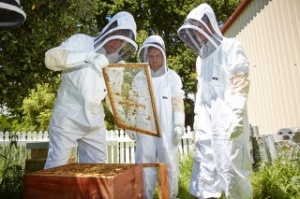Industry partnerships behind move for new agribusiness
The agribusiness education partnership is crucial for the future of the industry.
Success in creating a large-scale public-private partnership with the New Zealand primary industries is likely to see a new agribusiness secondary school subject created.
The brainchild of St Paul’s Collegiate School in Hamilton, agribusiness in secondary schools is being lauded as an obvious gap that once filled could have massive economic and employment benefits for New Zealand.
The new secondary school agribusiness programme was launched in November by the Minister for Primary Industries, Nathan Guy. The programme has been made possible thanks to a public-private partnership. Led by St Paul’s Collegiate School, Dairy NZ and Beef + Lamb.
 St Paul’s has had 48 students trial a pilot curriculum this year with another 85 signed up for next year. In addition there are now seven other schools formally involved in the project and will offering the new subject in 2016. These are: Southland Boys (Southland); Southland Girls (Southland); John McGlashan College (Otago); Christchurch Boys (Christchurch); Feilding High School (Manawatu); Lindisfarne College (Hawkes Bay) and Mt Albert Grammar School (Auckland).
St Paul’s has had 48 students trial a pilot curriculum this year with another 85 signed up for next year. In addition there are now seven other schools formally involved in the project and will offering the new subject in 2016. These are: Southland Boys (Southland); Southland Girls (Southland); John McGlashan College (Otago); Christchurch Boys (Christchurch); Feilding High School (Manawatu); Lindisfarne College (Hawkes Bay) and Mt Albert Grammar School (Auckland).
Following the pilot, and the Ministry of Education approval, it is hoped to offer Year 12 and 13 students at participating schools an NCEA qualification in agribusiness. The agriculture industry employs an estimated 11.4% of New Zealand’s workforce while the number of university graduates in agriculture related fields has been dropping in recent years.
The curriculum development has been possible through a $2 million dollar partnership investment with principal support from DairyNZ and Beef + Lamb New Zealand.
Other business partners include: BNZ, LIC, Zoetis, AGMARDT, NZ National Fieldays Society,Greenlea Premier Meats, Waikato Milking Systems, Waitomo Petroleum and Campbell Tyson. Strategy and Investment Leader for People and Business at DairyNZ, Mark Paine, says the agribusiness education partnership is crucial for the future of the industry. “We have forecast employment needs, and at graduate level alone we need 1000 people a year coming into the industry.
Currently we are nowhere near this figure,” he says. For the sheep and beef sector it’s important that the best and brightest students have the opportunity to choose agribusiness as part of their studies, as they will have an important role to play in the sector going forward, said Beef + Lamb New Zealand’s Project Manager Sector Capability, Doug Macredie. As part of the new curriculum development, St Paul’s Collegiate School is hosting the Minister of Primary Industries, Nathan Guy, to officially launch its Centre of Excellence for Agriculture Science and Business on 28 November in Hamilton. St Paul’s Collegiate School’s Headmaster Grant Lander says the new curriculum has been industry driven.
“A large part of the effort in developing the agribusiness curriculum has been partnering with agricultural industry organisations, universities and business. Everyone is excited at the prospect of what we have done so far and what we can still achieve. All involved with this initiative believe we are helping create something of national significance and it is genuinely innovative and ground breaking,” says Mr Lander.
Mr Lander says although there is already some emphasis to encourage young people into agricultural industry careers at a national level, there is no structured programme for secondary schools to encourage students to take up careers in agricultural science and business in preparation for tertiary study.
He says one of the main reasons the school was able to secure agricultural industry-good organisations DairyNZ and Beef + Lamb as principal partners for the development of the curriculum is due to a gap in the current educational system for agribusiness and the impact that gap has on our primary industries.



